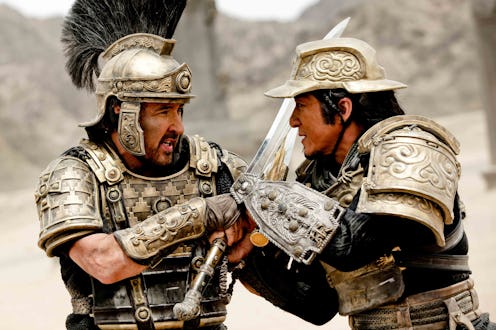
International superstar Jackie Chan's new flick is already a major hit overseas. Dragon Blade debuts in US theaters on Sep. 4, but the historical action movie has already piled up over $116 million in Chinese box office receipts. Chan himself is a modern Renaissance man; he's not only the biggest Chinese film star ever, but also a trained opera singer, award-winner stunt artist, and professor of tourism management, among many other accomplishments. However, it's unlikely that his new project will sell as many tickets in the US as it did in Chan's home country, set as it is during a famously glorious period in Chinese history. The Chinese audience had a stronger frame of reference for the movie. But is Dragon Blade based on a true story?
That's a question without a simple answer. Dragon Blade is set in Western China during the Han Dynasty. The Han Dynasty spans the period from 206 BC all the way to 220 AD, and was a period characterized by expansion, military action, and prosperity. Jackie Chan plays a fictional general by the name of Huo An, the leader of a peacekeeping force called the Silk Road Protection Squad. Corruption within the squad leads Huo An to be exiled to a force city called Goose Gate to repair recent damage. There, he becomes mired in the plight of Lucius (John Cusack), a Roman general who intended to ransack the city but instead takes shelter there to prepare for the arrival of his encroaching brother Tiberius (Adrien Brody) and his soldiers.
In its review, Variety accuses director Daniel Lee of dispensing "almost entirely with accuracy." However, the film does purport to be "based on true events." The theory that a group of Roman soldiers went missing on the Silk Road around the time the film is set is widely accepted. In 2010, the Telegraph reported on the genetic testing of residents of the western Chinese village of Liqian. Researchers found that the proportion of Caucasian DNA carried by some of the villagers was as high as 56 percent. This biological evidence suggests that the assertion that Dragon Blade runs with — that a troop of Roman soldiers founded a city in western China — can eventually be proven. However, the article also quotes Siena University anthropology professor Maurizio Bettini, who is skeptical:
For it to be indisputable, one would need to find items such as Roman money or weapons that were typical of Roman legionaries...Without proof of this kind, the story of the lost legions is just a legend.
The film certainly takes liberties in fleshing out a story that is still lost to history. But the patriotic spirit of the film has struck a chord with Chinese audiences. Chan told the website M1905 that accusations of pandering to fans with a project that features a strong national identity don't bother him. "I have always been a patriot. Is it wrong?" Chan asked. "If people are cursed for being a patriot, please curse me."
While Dragon Blade's historical accuracy score is pretty low, it is creating its own historical moment in Chinese cinema.
Image: Lionsgate Premiere